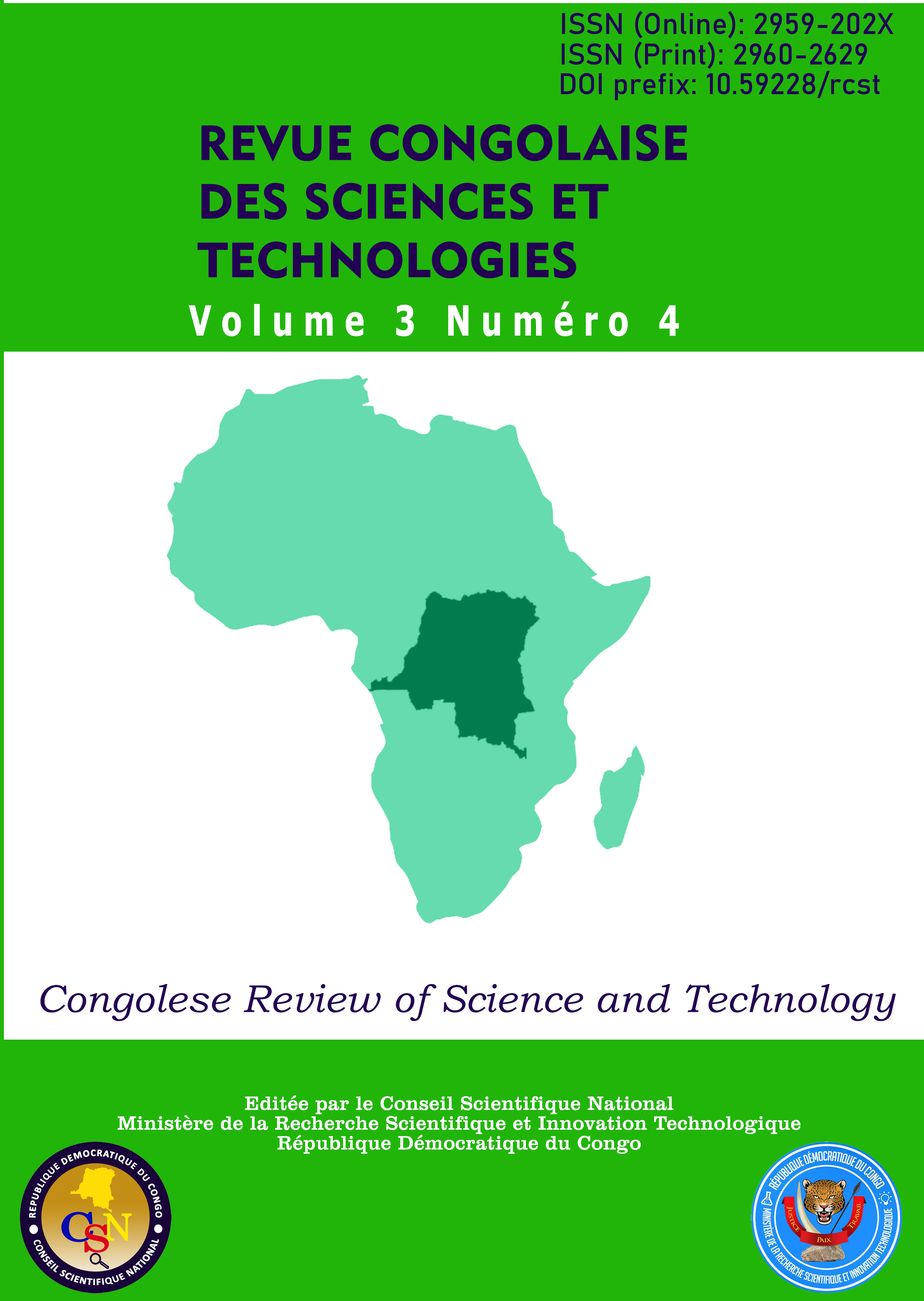Opinions des femmes bénéficiaires de la gratuité de la maternité dans le cadre de la couverture santé universelle en République Démocratique du Congo: Cas du Centre Hospitalier du Mont-Amba dans la Zone de Santé de Lemba, Kinshasa
Contenu principal de l'article
Résumé
La pauvreté est l’un des principaux obstacles à l’accès des femmes congolaises aux soins obstétricaux en République Démocratique du Congo (RDC), où la mortalité maternelle et néonatale reste élevée. Dans le cadre de la couverture santé universelle, la RDC a introduit le programme de la gratuité de la maternité qui vise à contribuer à la réduction de la mortalité maternelle et néonatale.
Cette étude qualitative exploratoire a été réalisée afin de recueillir les opinions des femmes bénéficiaires de la gratuité des soins de maternité, en utilisant les méthodes d’entretien semi-structuré et technique d’enregistrement audio grâce au guide d’entretien. Les données ont été analysées par une approche thématique, avec des catégories et sous-thèmes élaborés à partir des verbatim des participantes.
Les enquêtées ont rapporté une accessibilité générale aux soins, malgré des temps d’attente longs, l’attitude non chaleureuse du personnel soignant, la disponibilité limitée des fournitures et le nombre limité de lits à la maternité ont été mentionnés comme des facteurs de frustration, y compris la non extension de la gratuité aux soins néonatals.
Details de l'article
Rubrique

Ce travail est disponible sous licence Creative Commons Attribution - Pas d’Utilisation Commerciale - Partage dans les Mêmes Conditions 4.0 International.
Références
Abredu, J., Alipito, B., Dwumfour, C.K., Witter, S., Dzomeku, V.M. (2023). Factors influencing the free maternal health care policy under the national health insurance scheme’s provision for skilled delivery services in Ghana: a narrative literature review. BMC Pregnancy and Childbirth, 23(2),439–448. https://doi.org/10.1186/s12884-023-05730-2.
Bamfo, I., Sarfo, J.O., Ansah, E.W., Amoah, S.K. (2020). The impact of health on economic development: Ghana's COVID-19 management so far. European Journal of Economic Studies, 9(1), 3–10. DOI: https://doi.org/10.13187/es.2020.1.3.
Bohren, M.A., Mehrtash, H., Fawole, B., Maung, T.M., et al. (2019). How women are treated during facility-based childbirth in four countries: a cross-sectional study with labour observations and community-based surveys. The Lancet, 394(10210), 1750–1763. DOI: 10.1016/S0140-6736(19)31992-0.
Geremia, S., Valente, E.P., Mariani, I., Dalena, P., Lazzerini, M. (2023). Women’s suggestions on how to improve the quality of maternal and newborn care during the COVID-19 pandemic in Italy: A co-occurrence network analysis. Journal of Global Health, 13(2), 6013-6020. DOI: 10.7189/jogh.13.06013.
Goyet, S., Broch-Alvarez, V., Becker, C. (2019). Quality improvement in maternal and newborn healthcare: lessons from programmes supported by the German development organisation in Africa and Asia. BMJ Global Health, 4(5), e001562. https://doi.org/10.1136/bmjgh-2019-001562.
Hodgins, S. (2013). Achieving better maternal and newborn outcomes: coherent strategy and pragmatic, tailored implementation. Global Health: Science and Practice, 1(2), 146–153. Doi: 10.9745/GHSP-D-13-00030.
Jahan, N.A., Sultana, N., Bhuiyan, S.M., Ishaq, F. (2024). Universal Health Coverage in Bangladesh: Challenges and Prospects. The Dhaka University Journal of Earth and Environmental Sciences, 6, 1–13.
Kahindo, J.B. M., Mitangala, N.P., Nguemeleu, E.T., Nzanzu, M. (2023). Issues and challenges of universal health coverage in the Democratic Republic of Congo: A critical interpretative synthesis of the literature. Innovative Space of Scientific Research Journals, 66(1) ,42–56.
Kinenkinda, X., Mukuku, O., Chenge, F., Kakudji, P., Banzulu, P. (2017). Risk factors for maternal and perinatal mortality among women undergoing cesarean section in Lubumbashi, Democratic Republic of Congo. The Pan African Medical Journal, 26(4), 208–220. DOI:10.11604/pamj.2017.26.208.12148.
Kruk, M. E., Gage, A.D., Arsenault, C., Jordan, K., Leslie, H.H. (2018). High-quality health systems in the Sustainable Development Goals era: time for a revolution. Lancet Global Health, 6(11), e1196-e1252. DOI: 10.1016/S2214-109X(18)30386-3.
Lozano, R., Fullman, N., Mumford, J.E., Knight, M., Barthelemy, C.M. (2020). Measuring universal health coverage based on an index of effective coverage of health services in 204 countries and territories, 1990–2019: a systematic analysis for the Global Burden of Disease Study 2019. The Lancet,88, 1–35. https://doi.org/10.1016/S0140-6736(20)30750-9.
Maleya, A., Kakudji, Y.K., Mwazaz, R.M. (2019). Issues materno-foetales des grossesses non suivies à Lubumbashi, République Démocratique du Congo. The Pan African Medical Journal, 33(3), 66–81. Doi:10.11604/pamj.2019.33.66.18528.
McFadden, A., Gupta, S., Marshall, J.L, Shinwell, S. et al. (2020). Systematic review of barriers to, and facilitators of, the provision of high-quality midwifery services in India. Birth Issues in Perinatal Care, 47(4), 304–321. https://doi.org/10.1111/birt.12498.
Olaniran, A., Briggs, J., Pradhan, A., Bogue, E., Schreiber, B. et al. (2022). Stock-outs of essential medicines among community health workers (CHWs) in low- and middle-income countries (LMICs): a systematic literature review of the extent, reasons, and consequences. Human Resources for Health, 20(1), 58–67. DOI: 10.1186/s12960-022-00755-8.
Schmidt, H., Gostin, L.O., Emanuel, E.J. (2015). Public health, universal health coverage, and Sustainable Development Goals: can they coexist? The Lancet, 386(9996):928-30. DOI: 10.1016/S0140-6736(15)60244-6.

